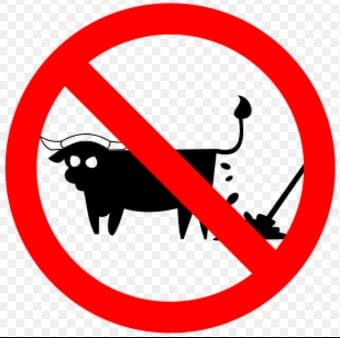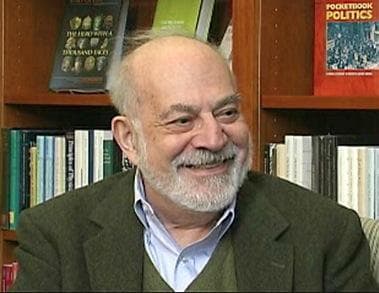Advertisement
Deep? Or Pseudo-Profound B.S.? Psychologists Explore Why Some Can't Tell

What do you think of the following sentences?
“The universe is the wisdom of objective external reality.”
“Experiential truth embraces the expansion of actions.”
“Death is only possible in intrinsic possibilities.”
Are they profound wisdom? Or are they bull?
If you thought they were profound, you might need your BS detector checked.
Created from the website wisdomofchopra.com, this “wisdom” was generated by randomly putting together words found in the tweets of Deepak Chopra, the physician and author.
Who is more likely to see such bull as profound? And why? These are the questions that motivated Gordon Pennycook, a psychology PhD student at the University of Waterloo in Ontario, Canada, and his colleagues to publish a paper this week called “On the reception and detection of pseudo-profound bulls---.” (They spelled out the full word, which academic psychology allows but the AP Stylebook we use does not.)
The researchers took quotes like those above and tested whether people could see pseudo-profound statements for what they were -- bulls---. Their findings suggest that people with higher intelligence and better critical-thinking skills are likeliest to detect BS. And more than one-quarter of the population they studied were particularly prone to buying in to it — and to holding, shall we say, "alternative" beliefs on topics from medicine to magic.
Advertisement
At first, this may seem like -- you know -- bull, but Gordon Pennycook is a real person. (Yes, Pennycook is his real name, despite its similarity to “poppycock.”) And if you wonder whether studying susceptibility to BS is important, just consider the possible effects on everything from votes in next year's election to purchases of purported cure-all supplements.
The paper, published in the journal Judgment and Decision Making, is a remarkable study, not only in profane language -- using the word bulls--- about 200 times -- but also in finally applying empirical analysis to the study of bull. Much has been written about it previously, but mostly just musings on the topic: “bulls--- about bulls---,” Pennycook joked.
Bulls--- hasn’t always gone by that name. It has been variously called crap (Hemingway), humbug, mumbo-jumbo, hot air, gobbledygook, hogwash, claptrap, woo-woo, baloney (Carl Sagan), bunk, poppycock or Orwellian doublespeak. “The fact that we have so many words for bulls--- shows how pervasive it is,” Pennycook said.
What is it exactly? First defined by Dr. Harry Frankfurt, author of the best-selling book "On Bulls---," it is different from lying, in which people deliberately manipulate or subvert the truth. Instead, bulls--- statements are designed to sound impressive but have no regard for the truth.
As the authors of the study note, “it attempts to impress rather than to inform; to be engaging rather than instructive.” Think politics, advertising or bureaucratese. As Carl Sagan put it, “credulous acceptance of baloney can cost you money…but it can be much more dangerous than that, and when governments and societies lose the capacity for critical thinking, the results can be catastrophic.”
What Makes Us Susceptible?
We all think that we have highly attuned BS detectors, probably from years of listening to politicians. But the key questions that psychologists are trying to understand are: What makes some people more prone to seeing bulls--- as profound? Are there personality traits, like open-mindedness or Sagan's critical thinking, that incline someone toward being more accepting or skeptical of it?
In various experiments, the researchers asked participants to rank various short phrases from 1 to 5, giving higher numbers to more profound statements. Some statements were manufactured bull, like the tweets above. Some were mundane, like “Most people enjoy some sort of music.” And some were profound, like “Your teacher can open the door, but you must enter by yourself.”
"We speak of bulls--- artists and spin doctors. To call it artistry implies originality, innovation and creativity."
Philosopher Harry Frankfurt
Most participants could detect bulls--- statements, and could easily differentiate mundane phrases from truly profound phrases. But some had difficulty weeding out the pseudo-profound from actually profound motivational statements. A full 27 percent gave bull statements a score of 3 or more.
What made them more prone to believing the bull was profound? To test that, the researchers followed the initial experiments by doing cognitive testing on the participants to assess their intelligence, and asked about spiritual leanings, views on conspiracy theories and alternative medicine.
They found that people who were less analytic and had lower cognitive ability were more prone to confuse the bull for the profound. That wasn’t all; those people were “more likely to hold religious and paranormal beliefs, and are more likely to endorse complementary and alternative medicine."
In short, it looks like Carl Sagan's intuition was right. Critical thinking may be your best defense against bull.
The Father Of BS Studies
Why is it worth developing ways to study BS empirically in the lab? It's the next step in a field that has taken off thanks to a seminal text that turned out to be a watershed: Dr. Frankfurt’s "On Bulls---". Originally published in an obscure journal article in 1986, underground buzz led Princeton University Press to publish it as a small book in 2005. It reached No. 1 on The New York Times Bestseller List, spending 27 weeks there. Today, the book has been cited over 600 times.

“It was a concept I was using quite freely but I didn’t really know what it meant,” Dr. Frankfurt, now an emeritus professor of philosophy at Princeton University, said in a phone interview. “As an analytical philosopher, it’s my job to clarify and illuminate concepts like that.”
We need to study bulls--- because we seem to have a higher tolerance for it than for lying, he argues. “We may seek to distance ourselves from bulls---, but we are more likely to turn away from it with an impatient or irritated shrug than with the sense of violation or outrage that lies often inspire,” he noted in his original article. For some reason, it doesn’t seem to violate our expectations of polite society.
Perhaps our tolerance is already explained by how we talk about it. “We speak of bulls--- artists and spin doctors,” Dr. Frankfurt told me. “To call it artistry implies originality, innovation and creativity.”
The book’s unlikely success could probably be chalked up to both the ubiquity of the concept in our daily lives and its profanity. The word itself carries power. “It was very provocative to see a book by an Ivy League professor dealing with such a topic,” he told me. “I made the topic respectable in a way.”
That power to provoke also struck Pennycook. “There is force behind the word bulls---, that implies, ‘We’re not OK with this,’ ” he said. “I think we should be forceful with our labels.”
The study authors specifically looked at “pseudo-profound bulls---.” That may sound redundant, but, as the authors note, it is only one type of bull. Thinking quickly, you can easily come up with other examples of bulls---. For me, the card game characterized by bluffing and “bulls---ting your way through” comes to mind, and particular situations (like college, an interview or life itself.) Others have written about various types: pomposity or fanaticism, pseudoscientific nonsense or academic writing which has no regard for meaning.
To test the pseudo-profound sort, the researchers needed to be able to create bulls--- at will. It turns out, that’s the easy part. Profound-sounding but ultimately meaningless sentences are everywhere on the Internet. There’s the Twitter hashtag #cosmicconsciousness or wisdomofchopra.com. They also included quotes from the New Age Bulls--- Generator, which is a load of fun.
(I hope you weren’t planning on getting anything else done today besides wasting time on fake pseudo-profound, new age tweets. You’re welcome.)
To explain how a psychology paper about bulls--- ends up on a health blog: It is worth noting that the two bulls--- generators for this paper were both inspired by quotations from Chopra, who is a physician. I’ve never read any of his books, so I cannot say whether his writings are bulls---, but profound-sounding misinformation is unfortunately all too common in health and medicine. Think about the late-night infomercials selling diet pills or vitamins. The wary health consumer should always be on the lookout for bulls---.
An interesting footnote: "On Bulls---" was translated into at least 16 languages. Dr. Frankfurt recalled that for some of them, like French, Russian, Portuguese and Hebrew, no exact equivalent for the term “bulls---” could be found, so they used the term “bulls---” spelled out in their own alphabet.
“I don’t understand how languages can get along without it," he said. "It’s not as if the phenomenon is unknown to them.”